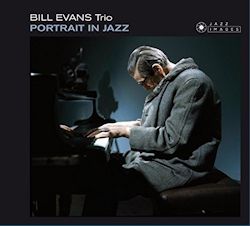 BUY NOW AmazonUK AmazonUS |
Bill EVANS (1929-1980) Bill Evans Trio Portrait in Jazz
|
Come Rain Or Come Shine
Autumn Leaves
Witchcraft
When I Fall In Love
Peri’s Scope
What Is This Thing Called Love
Spring Is Here
Some Day My Prince Will Come
Blue In Green
10.Autumn Leaves* (mono take)
11.Blue In Green* (from Kind Of Blue)
Bill Evans (piano), Scott LaFaro (bass), Paul Motian (drums)
rec. New York, USA on December 28, 1959
*bonus tracks: 1. from the same session but issued on the mono version of the LP
2. Miles Davis (trumpet), John Coltrane (tenor sax), Bill Evans (piano), Paul Chambers (bass), Jimmy Cobb (drums)
rec. New York, USA on March 2, 1959
When I recently reviewed a disc by the Girshevich Trio I wrote: “Jazz trios exist of course but there aren’t too many and when they’re good they’re very, very good and this is an example.” Well I need hardly say this is another, especially when it concerns Bill Evans. The photo on the inside cover shows Bill in characteristic pose, hair beautifully coiffed, wearing sunglasses and with a cigarette almost dangling from the right side of his downturned mouth and who looks for all the world like a member of ‘the mob’. His laid back look was also a feature of his playing which is so unique and recognisable. However, this disc is as much about bassist Scott LaFaro who’s playing inspired Evans to say he had “found my long-lost brother”. When you do some research in preparation for writing reviews you learn so much and the two incredible, almost unbelievable things I learned about Scott LaFaro were that this disc was recorded only 5 weeks after the trio got together and that Scott only started playing the bass aged 17! Music is responsible for throwing up more astounding people than any other art form I know. Child prodigies abound; Aleks Girshevich, drummer on the aforementioned disc Algorithmic Society (Tapestry Records 76026-2) was only 11 years old when he led his first trio and 12 on the disc and myriad other examples can be found in Jazz and even more in classical music but to discover such an intuitive player who’s style is so perfectly formed after such a short period is quite simply mind-blowing. It works out that he was only playing for a total of 8 years when he was tragically killed in a car accident and for a mere 6 when this disc was recorded. The other sad thing is that the Bill Evans Trio with Scott as bassist only cut 4 records of which this was the first. What strikes you is the obvious rapport that the three musicians have. Thanks to the magic of YouTube you can hear a really illuminating interview Bill gave about Scott to George Clabin and hear the disc Sunday at the Village vanguard recognised as one of the best live jazz recordings of all time. I would also urge you to check out: Bill Evans Virtual Museum Project https://www.youtube.com/watch?v=lV3jdOpX7vg for a marvellously clever video showing all Bill’s album covers in a virtual museum environment.
However, we should turn our attention back to Bill and the trio. This disc is as good an example of his trio as exists and of Bill’s mastery of the piano, his brilliant sense of timing and the colour he could inject into his playing; no wonder one of his records was entitled Everyone digs Bill Evans. When you add the supreme playing of Scott LaFaro and of drummer Paul Motian you have perfection personified.
I am Chairman of my local jazz club and it is interesting to note how few bands are inclined to play standards preferring to showcase their own compositions. If they are any good that’s OK by me except that when a band plays standards the audience can hear what the band is really made of because they can hear what the band can do with a tune we all know. This disc does that so brilliantly for all bar two are standards, the remaining ones are by Bill*. Bill’s gentle understated style and light touch brings out the very essence of tunes like Come Rain Or Come Shine and raises them into a different league; from the good to the great. Raising the tempo you’d normally associate with Autumn Leaves again makes you hear the tune with new ears. Bill’s Peri’s Scope has become a standard now inasmuch as it is often played by trios and small wonder. The way that Scott and Paul back Bill is so sympathetic as to be an object lesson in providing a rhythm section that acts as a richly woven canvas upon which Bill can paint his musical picture and filling in the background with essential detail as they do to great effect in What Is This thing Called Love for example. There has always been controversy over the authorship of Blue In Green with Miles Davis saying it was all his as were the rest of the tunes on the album Kind Of Blue while Bill claimed that in fact it was mostly his own composition, a claim backed up by various sources. We are treated to two versions of it on this disc courtesy of two bonus tracks, one a second version of Autumn Leaves recorded for the mono LP imprint, while the second version of Blue In Green is taken from Kind Of Blue with Miles, John Coltrane, Paul Chambers, Jimmy Cobb and Bill, a bonus indeed! I have to say the inclusion of Miles and John Coltrane does lift it to yet another level; the tune’s good however it’s played but with those two in the mix: wow! This disc is as good as any to cement Bill’s deserved reputation as one of Jazz’s all time greats.
Steve Arloff